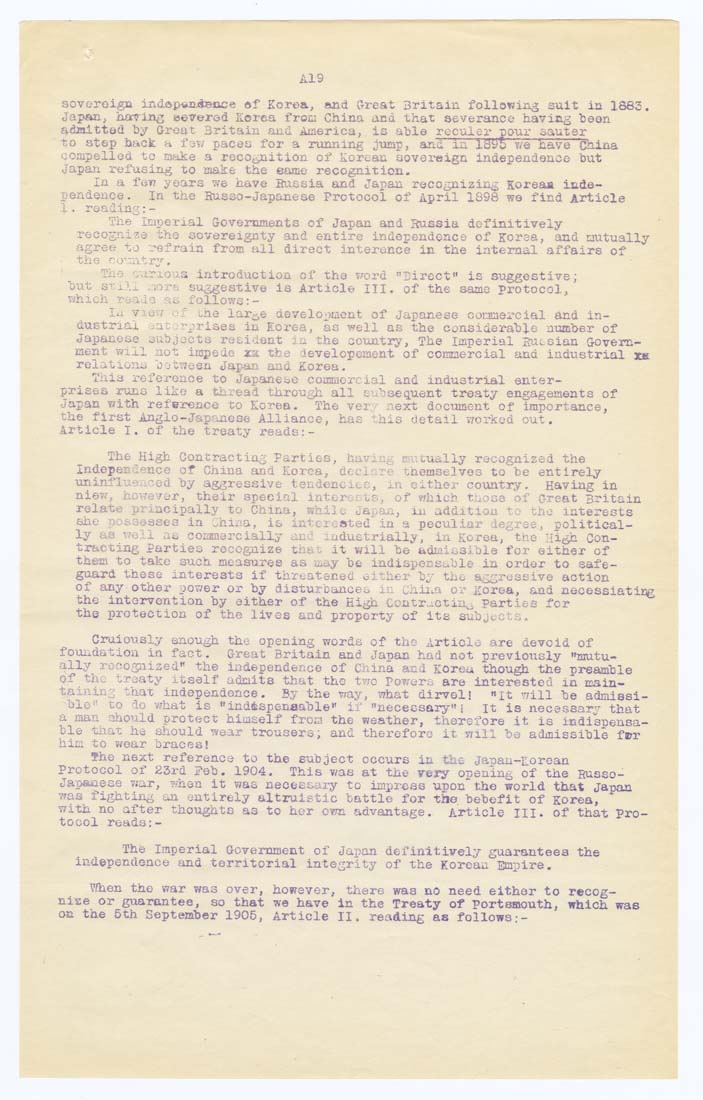A19
sovereign indep-sii*ence of Korea, and Great Britain following suit in 1883.
Japan, harving severed Korea from China and that severance having been
admitted by Groat Britain and America, is able reculer pour sauter
to step hack a few paces for a running jump, sind in lai^o v/e have China
compelled to make a recognition of Korean sovereign independence but
Japan refusing to make the eamo recognition.
In a few years we have Buasia and Japan recognizing Koreaa inde¬
pendence. In the Russo-Japanese Protocol of April 1898 we find Article
1, reading:-
The Imperial Governments of Japan and Russia definitively
recognize the sovereignty and entire independence of Korea, and mutually
agree to i-efrain from all direct interence in the internal affairs of
the co'mtry.
Ths carioua introduction of the word "Direct" is suggestive;
but sti.ll i-ioxe suggestive is Article III. of the same protocol,
which reads as follows:-
I.i view of i-he lar^e development of Japanese oonmercial and in¬
dustrial antorprlaes in Korea, as well as the considerable number of
Japanese subjocta resident in the country. The Imperial Suaoian Govern¬
ment will not impede xa the developement of commercial and industrial xb.
relations between Japan and Korea.
Thia reference to Japanese commercial and industrial enter¬
prises runs like a thread through all eu-osequent treaty engagements of
Japan with reference to Korea. The ver.■ next document of importance,
the first Anglo-Japanese Alliance, has this detail -worked out.
Article I. of the treaty reads:-
The High Contracting Parties, having mutually recognized the
Independence of China and Korea, declare themselves to be entirely
uninflU'3,j.ced by aggressive tendencite, in either country. Having in
niew, however, their special intcreats, of which those of Great Britain
relate principally to China, while Japan, in addition to the interests
she possesses in China, is interested in a peculiar degree, -oolitical-
ly aa well as commercially anc industrially, in Korea, the High Con¬
tracting Parties recognize that, it will be admiasible for either of
them to take such measures as may be indispensable in order to safe¬
guard these interests if threatened either by the aggressive action
of any other power or by disturoancea in chiiia or Korea, and necessiatiiK
the intorvontion by either of the High Contracting Parties for
the protection of the lives and property of its subjects.
Cruiously enough the opening words of the Article are devoid of
f oiuidation in fact. Great Britain and Japan had not previoualy "mutu¬
ally recognized" the independence of China and Korea though the preamble
of the treaty itself admits that tho two Powera are interested in main¬
taining that independence. By the way, what dirvell «it will be admissi¬
ble" to do ¥7hat is "indispenaable" if "necessary"! it is neoessar'- that
a man should protect himself from the weather, therefore it is indispensa¬
ble that he should wear trousers; and therefore it will be admissible txx
him to v/ear braces!
?he next reference to the subject occurs in the janau-rorean
Protocol of 23rd Feb. 1904. This was at the very opening of the Husso-
Japa^ese war, Tdien it was neceaaary to impress upon the world that Japan
was fighting an entirely altruistic battle for the bebefit of Korea,
with no after thoughts as to her own advantage. Article III. of that pro¬
tocol reads:-
The Imperial Government of JaT)an definitively guarantees the
ind.ep6ndsnce and territorial integrity of the Korean Empire.
T?hen the war was over, however, there was no need either to recog¬
nize or guarantee, so that we have in the Treaty of Portsmouth, which was
oa the 5th September 1905, Article II. reading ae follows--
|








